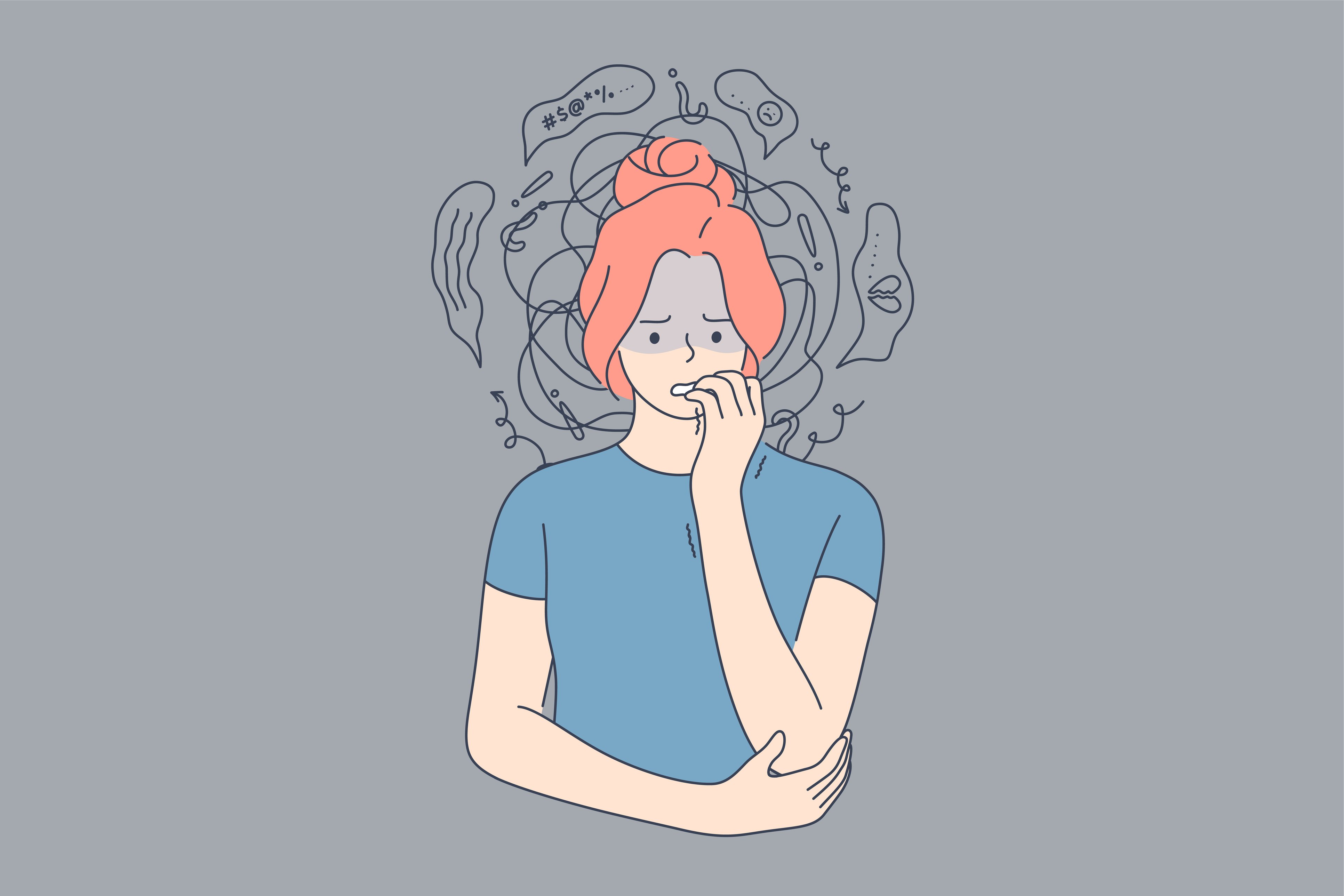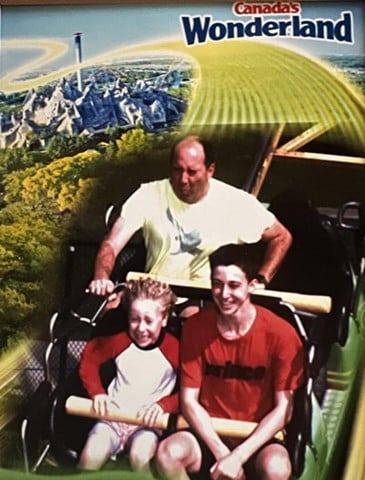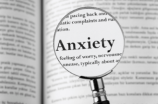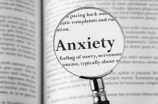White Knuckling: All Pain, No Gain
White Knuckling: All Pain, No Gain

What is white knuckling?
White knuckling is the term used to describe the process of fighting or powering through a situation that you find anxiety provoking. Imagine yourself on a scary roller coaster ride and how tight you might hold onto the metal bar that sits on your lap. It may feel like holding on tightly is the only thing that will keep you safe. You cope with your fear by squeezing the bar so tight that your knuckles turn white.

Note the man in the back and his literal white knuckles
What is white knuckling through exposures?
ERP, or Exposure Response Prevention, is an evidence-based therapeutic intervention commonly used to treat OCD. ERP entails gradually “exposing” yourself to your fears without performing rituals. White knuckling through exposures is when you force yourself to do exposures with a “grin and bear it” mindset. It’s the approach of “I will push through this no matter what because I have to in order for my OCD to get better.” But will that mindset lead to a successful outcome? Keep in mind that how you do exposures is equally as important as which exposures you do. It’s both the how and the which that leads to better, more rewarding, and longer-term outcomes.
Why is white knuckling an “all pain, no gain” approach
White knuckling reinforces the belief that your fears are threats. Although exposures to your fears may sometimes feel like threats, that doesn’t mean they are actually threatening. This process is known as emotional reasoning, which is a common thinking error amongst anxiety sufferers whereby you mistake your emotions for reality. The roller coaster ride may feel dangerous but likely is not. The amusement park has presumably gone through safety measures and protocols. No matter how tight you grip the metal bar, it will not affect the safety of the ride. Moreover, by white knuckling you get stuck in the idea that the threat is truly dangerous and remain trapped in the cycle that you can’t handle exposure to situations that cause anxiety and fear.
White knuckling through exposures, similar to performing mental rituals during exposures, compromises the “E” in ERP. Although white knuckling may help you to feel in greater control, safer, and more protected in the moment, it’s actually a hindrance to the exposure process. It’s less about getting through the exposure no matter what (even though the perfectionist in you might want to do the exposure perfectly or just right) and more about allowing the unpleasant thoughts, feelings, and sensations to be present.
Case example
You have contamination OCD. Your sister calls you complaining of bad stomach pain and asks you to take her to the hospital. Due to OCD you have spent years avoiding hospitals but since your sister is in terrible pain, you agree. This is an unplanned exposure but an exposure nonetheless.
You take your sister to the emergency room and do everything you can to manage your anxiety until you’re finally able to make your escape back to (perceived) safety, free from hospital germs and back to your baseline anxiety. You grit your teeth, hold your breath, grin and bear, and white knuckle through the entire process. As soon as you are able to leave the hospital, the lowering of your anxiety will likely feel so great that it reinforces why you avoided your fear in the first place! You go back to avoiding hospitals and you are no further ahead in learning how to tolerate the fear, anxiety and uncertainty over being in a hospital and around germs. The contamination OCD has been strengthened and emboldened.
Alternatives to white knuckling - So what can you do instead of white knuckling?
- Choose to stop avoiding the discomfort of anxiety. Instead, be willing to experience fear and even panic.
- Remember that the goal of an exposure is not to feel unafraid, relaxed or safe but rather to willingly experience the anxiety and uncertainty. Doing so will likely lead to more positive and longer term change.
- Expose yourself to your fears in a real way. Going through the motions of an exposure is a form of resistance or avoidance because you’re not authentically in the moment while facing your fears. The how you do exposures matters!
- Be where you are and pay attention to the here and now. Be in the moment, even when it feels scary. Expect that it may feel uncomfortable to let go of the feeling of control.
- Acknowledge that you have the agency to drop the white knuckling. It won’t happen on its own. You have to choose to do it, even if at first you can only do so for a moment or two.
- Instead of trying to feel less through white knuckling, work toward being better at feeling more.
- Accept that this is a process. It takes time, patience, and repetition. Like music legend Bruce Springsteen said when he got his first guitar at the age of fourteen: “I practiced and practiced and practiced, 10,000 times? Way more than 10,000 times!”
- Be compassionate and hold yourself gently. This is really hard work.
Why should you consider alternatives to white knuckling? For the reasons that you white knuckled in the first place. Because you want to get better and you’re willing to do really hard things in order to make that happen. So that life can get bigger again. So that you can go back to doing the things you value the most with the people that are most important to you. So that you can move further away from OCD and closer toward living the life that you want to live.
Questions for discussion
When was the last time you white knuckled your way through an exposure? Was that exposure helpful?
How could you do the same exposure without the white knuckling?
This post is presented in collaboration with ADAA's OCD and Related Disorders SIG. Learn more about the SIG.
___________
References:
- Drew. (2022, April 20). When does the white knuckling end? (No. 204) [Audio podcast episode.] In The anxious truth. https://theanxioustruth.com/ep-204-white-knuckling/
- Grayson, J. (2014). Freedom from obsessive-compulsive disorder: A personalized recovery program for living with uncertainty (2nd ed.). Berkeley.
- Harris, R. (2008). The happiness trap: How to stop struggling and start living. Trumpeter.
- Hershfield, J. (2023, January 16). An update on the poetry of evidence-based psychotherapy for OCD. Sheppard Pratt. https://www.sheppardpratt.org/news-views/story/an-update-on-the-poetry-of-evidence-based-psychotherapy-for-ocd/
- Kabat-Zinn, J. (1994). Wherever you go, there you are: Mindfulness meditation in everyday life. Hachette Books.
- O’Connor, K., & Aardema, F. (2012). Clinician’s handbook for obsessive compulsive disorder. John Wiley & Sons.
- Phillipson, S. J. Choice. OCD Online. https://www.ocdonline.com/choice
- Ralph, S. (Host). (2020, December 20). Dr. Sam Greenblatt - Frequent reasons therapy doesn’t work and how to improve it (No. 256) [Audio podcast episode]. In The OCD stories. https://theocdstories.com/episode/dr-sam-greenblatt-frequent-reasons-therapy-doesnt-work-and-how-to-improve-it-256/
- Seif, M. N., & Winston S. (2014). What every therapist needs to know about anxiety disorders: Key concepts, insights, and interventions. Routledge.
- Twohig, M. P., Abramowitz, J. S., Bluett, E. J., Fabricant, L. E., Jacoby, R. J., Morrison, K. L., Reuman, L., & Smith, B. M. (2015). Exposure therapy for OCD from an acceptance and commitment therapy (ACT) framework. Journal of Obsessive-Compulsive and Related Disorders, 6, 167-173. https://doi.org/10.1016/j.jocrd.2014.12.007




















